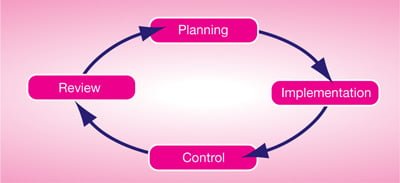
Organisations require skilled and well-qualified managers and leaders to drive change initiatives and effectively manage employees through the process. The only chartered professional body within the UK dedicated to creating high-quality standards for management and leadership is the Chartered Management Institute (CMI). It has around 90,000 members and 400 business members and has been providing advice that supports individuals and businesses for more than 60 years.
The products and services CMI provides support the development of managers and leaders in both the public and private sector. This case study illustrates how CMI supports the development of effective managers. Effective managers are vital when implementing change within a business.

Campus CMI
To ensure that schools and colleges are able to shape and develop future managers and leaders, CMI have created Campus CMI. The resources provided by Campus CMI help to deliver management qualifications. These are designed to shape the managers and leaders of the future. In doing so, they help to develop talented individuals who are able to manage the process of change effectively.

Importance of effective leadership
To meet these challenges, managers must anticipate and plan for effective improvements to the organisation’s processes. On the one hand, this may involve change management. This requires leaders who have the tools or structures that keep any change effort under control. The goal with change management is to minimise the impacts of the change. On the other hand, this may involve change leadership. This involves supporting the change process. Leaders need to have the vision to change an organisation. To do this they need to harness the driving forces of change in order to transform an organisation.

Every change strategy will involve setting objectives. It is important, therefore, to constantly evaluate change programmes. By doing this it is possible to monitor whether changes have helped an organisation to improve the way it meets its business objectives.
Serco is one of the world’s leading service and outsourcing companies. It employs more than 70,000 people and helps governments to improve services. In 1994 Serco took over management of HMP and YOI Doncaster, a category ‘B’ remand centre in South Yorkshire. The prison had faced many challenges in recent years. For example, the prison inspection report identified a number of areas where improvements could be made. The report rated the prison at Performance Level 2, where Level 4 is the highest and Level 1 the lowest. Staff morale was low, with a high turnover of first-line managers. To address these issues Serco decided to use CMI’s programme of management training and qualifications. CMI training provides managers with the knowledge and skills required to implement changes to improve the centre’s performance.
Change is inevitable and needs to be handled effectively. To remain competitive organisations need to continually look for more efficient and effective ways to operate. Change management is therefore high on the agenda for many organisations.

Factors affecting change
Every organisation is a complicated system so managing change is not necessarily an easy process. For example, there will be a number of different interdependent parts affecting the whole organisation. Changes in technology could have an impact on working procedures, the structure of the organisation and its people. As leaders manage change, they have to manage the different inter-related parts of the organisation. The ability to manage these parts well is therefore a vital skill for managers.
Managing change involves making decisions at different levels. These include:
- Strategic decisions – major decisions affecting the whole of an organisation.
- Tactical decisions – at departmental level to work towards achieving change objectives.

- ‘Total imposed package’ which comes from the top, covering the whole organisation and is implemented in one go.
- ‘Imposed piecemeal initiative’ where change is imposed but in stages.
- ‘Negotiated total package’ where the aim is to seek a package of change via negotiations with the staff.
- ‘Negotiated piecemeal package’ where there is a gradual implementation of change through a series of negotiations with the workforce.
Communication plays a key role in the process of change. Managers and leaders need to identify effective communication channels through which to reach the appropriate stakeholders. This must happen at every stage in the change process. Employees need to understand the reasons for change. They may want to ask questions to clarify how they can support the process of change. As planning takes place a time frame should be drawn up.

CMI qualifications provide managers with the skills and competencies required to plan, implement, control and review the change process. For example, at HMP & YOI Doncaster, having identified areas of weakness within the prison, it was important that managers could identify solutions that could bring about change to create improvements. Training by CMI helped managers to respond to issues in an imaginative and flexible way. It also provided managers with the opportunity to take qualifications that would improve their career development.

Effective managers take barriers to change into account. They do this during the planning stage of the change programme. For example, the culture of an organisation can be a barrier to change. The culture is the way in which employees work through custom and practice, reflecting the norms of an organisation. This can makes employees rigid in their approach to their work which could create resistant to change if not managed effectively.
Removing resistance to change
Removing resistance is a vital role for managers. To minimise resistance an effective manager will communicate clear objectives. This will help everybody to get involved in the process and enable them to understand why change is necessary. Communication also helps to avoid rumours. Change can be a sensitive process. Employees need to feel that they have sufficient resources to carry out any changes. Some staff may need retraining. Involving employees at each stage helps to create support for the change process.

As change takes place, it is important to monitor and evaluate the results of the change programme. This involves relating the changes to the original strategy and objectives. If changes are not evaluated it will be difficult for managers to determine how well they managed the process. Monitoring and review will also help them to understand where further improvements may be required. If, for some reason, the change process has not been successful, managers can evaluate why the change process has failed.
Evaluating results

The changes that took place at HMP & YOI Doncaster were striking. After the CMI training and development, staff morale and managers’ confidence grew. They started to think more strategically about how to overcome challenges. First-line manager turnover fell significantly. This was because the issues identified in inspection reports had been tackled.
Managers were able to approach challenges in a completely different way. They developed a better understanding of leadership and management, and of their own strengths and development needs as leaders. The programme helped to reduce costs and retain talent. Ultimately, it enabled individuals to contribute effectively to the setting and fulfilling of the organisation’s objectives.

CMI training and development ensures that managers have the skills and competencies required to manage their team through a process of change. It enables them to deal with the change process and to monitor and evaluate change. This helps to reduce possible resistance to change and establish if the change objectives were achieved.



